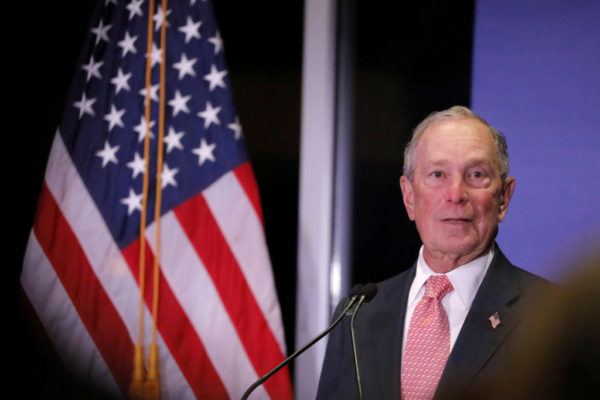
- Details
- By Native News Online Staff
NEW YORK — On Thursday, Democratic presidential candidate Mike Bloomberg released a Native American plan with calls for upholding tribal sovereignty and improving the lives of tribal citizens.
His plan is comprised of four pillars: 1) reaffirm Indian Country land rights, upgrade infrastructure, and combat environmental injustice; 2) elevate tribal authority and protect Native American women and girls; 3) improve health care for American Indians and Alaska Natives; and 4) enhance economic and educational opportunities for tribal members.
According to his campaign, Bloomberg’s plan would reverse historical injustices, affirm tribal sovereignty and protect the most vulnerable Native Americans from assault, attacks on voting rights and health disparities.
In a press release, Bloomberg’s campaign states, “Donald Trump is a racist and disrespectful toward Native Americans. His federal budgets have proposed hundreds of millions of dollars in cuts to essential services for Native Americans, including education, law enforcement, natural resource management and social services.
“The hostility and disrespect Donald Trump has shown toward Native Americans is disgraceful, and it will end with my administration,” Bloomberg continued. “The indigenous peoples of this land deserve respect – respect for their sovereignty, respect for their right to self-governance, respect for their culture – and that’s what they’ll receive when I’m president. I will increase Native American representation in the White House, deliver more resources to the Indian Health Service and tribal colleges, and treat tribal nations with the dignity they deserve.”
Bloomberg’s Plan is as follows:
Reaffirm Indian Country land rights, bolster infrastructure, and protect Native lands from environmental degradation.
- Rebuild tribal homelands by reaffirming and restoring the Interior Department’s authority to take tribal lands into trust.
- Assess and fund tribes’ infrastructure needs and bring high-speed internet to the nearly one-third of people living on tribal lands who lack it.
- Reauthorize the Native American Housing Assistance and Self-Determination Act to improve housing in Indian Country.
- Reverse Trump-era environmental protection rollbacks to ensure Indian Country has clean air and clean water.
- Negotiate for indigenous rights protection in all international climate agreements and work with tribes to make tribal communities, lands, and infrastructure more resilient.
- Engage in full and meaningful consultation with tribes on federal land management.
Strengthen tribes’ legal and civil rights, protect indigenous women and girls, and elevate Native voices in government.
- Expand tribal legal jurisdiction over crimes committed on reservations, while ensuring constitutional protections for all.
- Launch an unprecedented effort to strengthen protections for indigenous women and girls, who face violence, sexual assault, and homicide, as well as trafficking, at disparate rates.
- Work with Congress to Pass Savanna’s Act, reauthorize the Violence Against Women Act with strong protections for Native communities, and direct the Justice Department to work with tribes to investigate cases of Missing and Murdered Indigenous Women (MMIW).
- Support and defend the Indian Child Welfare Act to ensure that Native children are not unnecessarily separated from their communities.
- Appoint a senior White House adviser for Native issues to elevate tribal issues to the top of the federal government and restore the Tribal Nations Conference.
- Discourage states from imposing unreasonable voting requirements on Native Americans and encourage them to accept tribal IDs as valid voter identification.
- Eliminate discriminatory laws and practices, such as voter roll purging.
Improve health care for American Indians and Alaska Natives.
- Fully fund the Indian Health Service — including facilities operated by the IHS and tribes, as well as Urban Indian Health Programs — and work with Congress to make full funding mandatory.
- Lower Native Americans’ extraordinarily high rate of death by suicide by increasing access to mental health care and supporting the Native American Suicide Prevention Act.
- End the opioid and behavioral health epidemics affecting Native communities by expanding access to addiction treatment and mental health services.
Improve economic and educational opportunities for tribal members.
- Raise the federal minimum wage to $15/hour.
- Put money back into Native Americans’ pockets by expanding the Earned Income Tax Credit (EITC) and distributing it monthly, in line with people’s real needs.
- Triple direct federal Title III funding to Minority Serving Institutions (MSIs), including tribal two-year and four-year colleges.
- Invest in job creation and entrepreneurship by increasing federal funding for Community Development Financial Institutions (CDFIs) and the Small Business Administration’s Small Business Investment Company (SBIC) Program.
More Stories Like This
Native News Weekly (August 25, 2024): D.C. BriefsNCAI Releases Sttatement on the Passing of Rev. Jesse Jackson
Colusa Indian Energy Participates in Port of Quincy Town Hall on Columbia Basin Power Project
Q&A: Jingle Dress Dancer Answered Call to Ceremony in Face of ICE Violence
Haaland Gets First Hand Look at Efforts to Address Homelessness in Albuquerque
Help us defend tribal sovereignty.
At Native News Online, our mission is rooted in telling the stories that strengthen sovereignty and uplift Indigenous voices — not just at year’s end, but every single day.
Because of your generosity last year, we were able to keep our reporters on the ground in tribal communities, at national gatherings and in the halls of Congress — covering the issues that matter most to Indian Country: sovereignty, culture, education, health and economic opportunity.
That support sustained us through a tough year in 2025. Now, as we look to the year ahead, we need your help right now to ensure warrior journalism remains strong — reporting that defends tribal sovereignty, amplifies Native truth, and holds power accountable.
 The stakes couldn't be higher. Your support keeps Native voices heard, Native stories told and Native sovereignty defended.
The stakes couldn't be higher. Your support keeps Native voices heard, Native stories told and Native sovereignty defended.
Stand with Warrior Journalism today.
Levi Rickert (Potawatomi), Editor & Publisher

